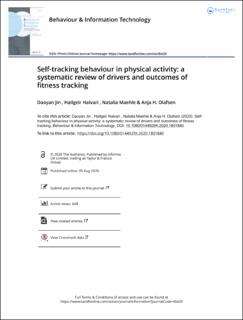| dc.contributor.author | Jin, Daoyan | |
| dc.contributor.author | Halvari, Halgeir | |
| dc.contributor.author | Mæhle, Natalia | |
| dc.contributor.author | Olafsen, Anja Hagen | |
| dc.date.accessioned | 2020-12-02T14:46:03Z | |
| dc.date.available | 2020-12-02T14:46:03Z | |
| dc.date.created | 2020-08-10T13:48:48Z | |
| dc.date.issued | 2020 | |
| dc.identifier.citation | Jin, D., Halvari, H., Maehle, N., & Olafsen, A. H. (2020). Self-tracking behaviour in physical activity: A systematic review of drivers and outcomes of fitness tracking. Behaviour & Information Technology, 39. | en_US |
| dc.identifier.issn | 0144-929X | |
| dc.identifier.uri | https://hdl.handle.net/11250/2711566 | |
| dc.description.abstract | Advances in technologies (e.g. smartphones, wearables) have resulted in the concept of ‘self-tracking’, and the use of self-tracking technologies in physical activity (i.e. fitness tracking) is on the rise. For example, many people track and monitor their fitness-related metrics (e.g. steps walked, distance ran, and calories burned) to change their behaviours or keep themselves active. Despite the widespread application of self-tracking in fitness, relatively little is known about its drivers and outcomes. To address this gap, the current paper provides an overview of the literature (empirical papers) on self-tracking with a focus on the drivers and outcomes of fitness tracking behaviour and offers four important contributions. First, it identifies 19 drivers of fitness tracking technology usage. Second, it discusses four main outcomes of fitness tracking behaviour. Third, by drawing on the existing studies conducted across various fitness tracking technologies (e.g. fitness trackers, apps) and user groups (e.g. patients, seniors, and females), it provides valuable insights that can be generalisable to other settings (e.g. other types of users and fitness tracking products). Finally, the current paper provides important practical implications and addresses avenues for future research. | en_US |
| dc.language.iso | eng | en_US |
| dc.publisher | Taylor & Francis | en_US |
| dc.rights | Attribution-NonCommercial-NoDerivatives 4.0 Internasjonal | * |
| dc.rights.uri | http://creativecommons.org/licenses/by-nc-nd/4.0/deed.no | * |
| dc.subject | drivers | en_US |
| dc.subject | empirical studies | en_US |
| dc.subject | literature review | en_US |
| dc.subject | outcomes | en_US |
| dc.subject | physical activity | en_US |
| dc.subject | self-tracking | en_US |
| dc.title | Self-tracking behaviour in physical activity: a systematic review of drivers and outcomes of fitness tracking | en_US |
| dc.type | Peer reviewed | en_US |
| dc.type | Journal article | en_US |
| dc.description.version | publishedVersion | en_US |
| dc.rights.holder | © 2020 The Author(s) | en_US |
| dc.source.pagenumber | 1-21 | en_US |
| dc.source.volume | 39 | en_US |
| dc.source.journal | Behaviour and Information Technology | en_US |
| dc.identifier.doi | 10.1080/0144929X.2020.1801840 | |
| dc.identifier.cristin | 1822498 | |
| cristin.ispublished | true | |
| cristin.fulltext | original | |
| cristin.qualitycode | 1 | |

